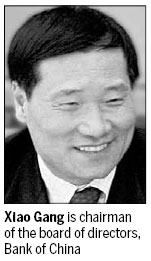

US should refrain from launching QE3 and tighten its monetary policy to raise the world's confidence in the dollar
In responding to the global financial crisis, many countries adopted extremely loose monetary policies. These policies were necessary to ease their immediate pains and address the global recession, but they have had undesirable consequences in the long run, and for some countries these have now become a pressing challenge.
For the past several years, the financial crisis and policy responses to it have cast long shadows over advanced economies. The overall deleveraging and structural adjustment is far from complete and the repair of private balance sheets still has a long way to go. Even worse, various governments' stimulus efforts to support their economies have resulted in historically large fiscal deficits.
Monetary policy is not a tool that can solve every problem. With recovery still sluggish in the United States and Europe, there are fears of high inflation, which could lead to stagflation. Global headline inflation has risen a full percentage point to 3.6 percent since April last year. The US' second round of quantitative easing (QE2) failed to stimulate investment as well as job creation.
Although the US debt ceiling was lifted, the country's credit rating was downgraded, triggering turmoil on the international markets. There is a real sense that a new crisis point is fast approaching.
It is a recognized structural problem of the global economy that US over-consumption has been a principal source of world demand. Restructuring the model requires the US to change its national savings, consumption and investment habits so that it doesn't rely too heavily on consumption and government spending.
However, the US is trying to sidestep this necessary restructuring. Initiating QE3 may boost the financial and commodity markets for a short time, but it will bring about new asset bubbles and stoke further inflationary expectation, which will create problems for their own and the emerging economies.
It will take time to rebalance the US trade position from deficit to balance, because the country must produce more than it consumes, which requires that the sum of private and public savings match its domestic investment. While the personal savings rate in the US has modestly increased after the crisis, this is just a start, moreover, the national fiscal deficit crisis has been under way, and the fiscal trajectory is unsustainable.
The labor market has suffered lasting structural damage, and slowing hiring contributes to the higher rate and longer period of unemployment. Moreover, long-term unemployment impairs labor force's skills and employability, given the US safety net is less generous than in Europe, the consequence of persistent joblessness will be harsher. But the US unemployment rate should not be regarded as a reason for launching QE3.
In an integrated global economy, no individual economy can be "decoupled".